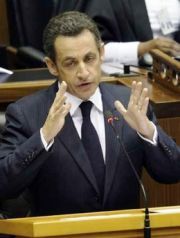Climate change driving Darfur crisis – Sarkozy
April 18, 2008 (PARIS) — French President Nicolas Sarkozy told the world’s biggest carbon polluters Friday that global warming was becoming a driver of hunger, unrest and conflict, with the war in Darfur a concrete example.

Water scarcity and rivalry for farmland and fishing resources were emerging as “major challenges,” especially in Africa, he said.
“In Darfur, we see this explosive mixture from the impact of climate change, which prompts emigration by increasingly impoverished people, which then has consequences in war,” said Sarkozy.
“If we keep going down this path, climate change will encourage the immigration of people with nothing towards areas where the population do have something, and the Darfur crisis will be only one crisis among dozens of others.”
Nearly five years old, the war in western Sudan has claimed more than 200,000 lives from fighting, famine and disease and 2.2 million others have been left homeless. The exodus has had a spillover effect on neighboring countries.
Sarkozy said France would double its emergency food aid this year to EUR60 million and said the world “cannot remain indifferent to the unrest” in countries where people were hungry.
Soaring prices for basic grains – rice, wheat, soybean and corn – have provoked protests and rioting in at least half a dozen developing countries in past months.
Experts say the food crisis has multiple causes. These include the surging demand for meat in fast-growing China and India, which encourages land to be turned over for grazing and grain to be grown for animal fodder rather than food.
Global warming may be amplifying water scarcity, especially in Australia, which is one of the world’s breadbaskets, according to some opinion. The U.S. rush to biofuels to help reduce carbon emissions has also been fingered.
The Paris talks gathered ministers from Australia, Brazil, the U.K., Canada, China, France, Germany, India, Indonesia, Italy, Japan, South Korea, Mexico, Russia, South Africa and the U.S.
Launched by Bush last September, the so-called Major Economies Meetings aim at fast-tracking negotiations towards a new U.N. pact on climate change by the end of 2009.
The process also looks at how to enlist smart technology and energy-intensive industries to cut greenhouse-gas emissions.
MEM leaders are to meet at the Group of Eight summit in Toyako, Japan in July 7-9, where they are to issue a raft of recommendations.
One idea being aired is for a 50% global emissions cut by 2050.
Yvo de Boer, head of the U.N. Framework Convention on Climate Change told reporters “substantive progress” was made in Paris.
But divergence remained over a long-term target and a further meeting might be called before Toyako to address this, he said.
“Some countries (are) preferring a numerical goal, some countries are favoring a numerical goal provided it’s aspirational rather than more binding, and others (are) more in favor of setting a sense of direction than trying to pin things down on particular numbers,” he said.
The two-day Paris meeting was soured Thursday by criticism of Bush’s new climate plan.
Bush Wednesday said he wanted U.S. emissions to peak by 2025, a measure attacked as too late and too timid by Europeans, while his demand that developing countries make concessions was fiercely attacked by South Africa.
(AFP)
